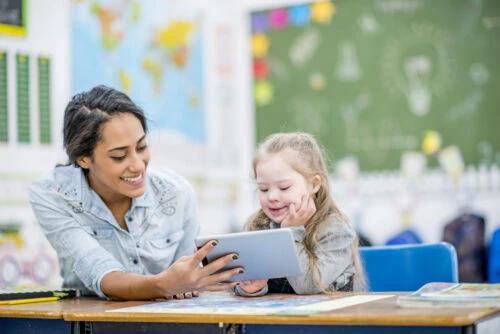Welcome to your comprehensive guide on personalized learning—an educational approach designed to meet each learner’s unique needs and pace. Whether you are a high school student contemplating your future, a mid-career professional seeking to enhance your skills, or someone exploring diverse and inclusive workplaces, understanding personalized learning is critical to unlocking your full potential.
Explore the nuances of personalized learning, its benefits, essential components, and how to apply it across various settings. You will also discover how personalized learning shapes future education and workforce development trends, preparing individuals for a rapidly evolving world.
Read on to gain insights into how personalized learning can be part of your educational journey and career development, helping you to adapt, grow, and succeed in an increasingly complex society.
Understanding Personalized Learning
Personalized learning tailors education to meet individual students’ unique needs and preferences. Instead of a one-size-fits-all approach, it customizes learning experiences, ensuring every learner engages optimally. This method leverages educational psychology and technology insights to create a dynamic learning environment.
Core Principles of Personalized Learning
At its core, personalized learning focuses on:
- Student Autonomy: Empowering students to have a voice in their learning processes and outcomes.
- Flexible Pacing: Allowing students to progress through material at a speed that matches their learning ability and prior knowledge.
- Tailored Instruction: Adapting teaching methods and resources to fit students’ learning styles and interests.
Benefits to Student Engagement
Personalized learning boosts engagement by making education relevant to students’ lives and career goals. It also fosters a deeper connection to the material, as they can see the direct benefits of what they are learning.
Various educational frameworks and models support this approach. According to the U.S. Department of Education, personalized learning addresses academic needs and social and emotional growth, preparing students for the complexities of the modern world. Additionally, ongoing advancements in educational technology have enabled schools and educators to implement personalized learning more effectively. Tools such as learning management systems and adaptive testing software are discussed further in this resource’s tools and technologies section.
Benefits of Personalized Learning
Personalized learning offers significant advantages over traditional educational methods by focusing on individual student growth, performance, and interests. This approach benefits students, educators, and academic institutions alike.
Advantages for Students
Students enjoy a range of benefits from personalized learning environments:
- Increased Motivation: Connecting learning to students’ goals and interests makes them more likely to be motivated and remain engaged.
- Better Outcomes: Personalized settings often lead to improved academic performance, as instruction aligns more closely with each student’s learning style and pace.
- Enhanced Skills: Such environments foster academic and critical life skills like problem-solving, self-regulation, and adaptability.
Advantages for Educators and Institutions
Educators and educational institutions also gain from implementing personalized learning:
- Improved Instructional Skills: Teachers can develop more nuanced teaching strategies as they adapt to their students’ diverse needs.
- Optimized Resources: Schools can utilize resources more efficiently by tailoring materials and programs to student needs, reducing waste.
- Data-Driven Decisions: Using data to inform decisions enhances the educational process and ensures that interventions are based on solid evidence.
Personalized learning helps prepare students for the future by making them adaptable, lifelong learners who are well-equipped to handle changing job requirements. This is massively important in a rapidly evolving job market where adaptability is critical.
Critical Components of Personalized Learning Systems
Effective personalized learning systems are built on several key components that ensure everyone receives an education tailored to their needs and goals. These elements are essential for creating a conducive learning environment.
Individual Learning Plans
Every student has a unique learning plan that outlines personal goals and paths. These plans adjust to stay aligned with students’ evolving educational needs and aspirations.
Competency-Based Progression
Students progress based on mastery of a subject rather than time spent in class. This allows for acceleration or additional support as needed.
Flexible Learning Environments
The learning environment adapts to support both group work and individual study, which can include modifications in the physical or digital setting.
Real-Time Data Usage
Educators use data to adjust teaching strategies and resources immediately, continually enhancing learning experiences. Furthermore, this data aids in identifying students who might need extra attention or advanced challenges, ensuring no one falls behind or disengages.
Technologies such as adaptive learning software and AI tutors are becoming increasingly common and vital to support these components. The tools and technologies section provides detailed information on how these technologies can be integrated. Educational models and technologies continue to evolve, and it’s important to support these essential personalized learning components as they develop.
Challenges and Considerations in Personalized Learning Implementation
While personalized learning holds great promise, implementing it effectively comes with challenges and considerations. Understanding these can help educators and policymakers create more effective learning environments.
Resource Allocation
One of the primary challenges is the significant resource allocation required. Schools may need to invest in new technologies, training for educators, and ongoing support to ensure successful implementation.
Data Privacy and Security
With the increased use of digital tools, ensuring the privacy and security of student data is paramount. Educational institutions must adhere to regulations and implement robust security measures, as outlined by resources like the U.S. Department of Education.
Teacher Training and Support
Teachers play a crucial role in personalized learning and need adequate training to effectively utilize new tools and strategies. Ongoing professional development is essential for them to adapt and thrive in this environment.
Equitable Access
Maintaining equitable access to resources is essential to avoiding disparities in educational opportunities. All students should have access to the tools and support needed to benefit from personalized learning regardless of their background.
Tools and Technologies That Support Personalized Learning
Several tools and technologies are foundational in facilitating personalized learning. These innovations enable educators to tailor education to individual student needs, optimizing learning outcomes.
Learning Management Systems (LMS)
LMS platforms such as Canvas and Blackboard are pivotal in personalizing education. They allow educators to:
- Track student progress in real time.
- Deliver customized content and assessments.
- Facilitate interactive and collaborative learning.
Adaptive Learning Software
Software that adapts to a student’s learning pace and style is critical for personalized learning. These tools adjust the difficulty of tasks based on student performance, ensuring appropriate challenge levels.
Artificial Intelligence (AI) Tutors
AI tutors provide individualized assistance and feedback, allowing students to learn and practice conveniently. These systems can address specific student difficulties and questions, offering a highly personalized learning experience.
Data Analytics Tools
Data analytics tools help educators to understand and predict student learning patterns and outcomes. This insight allows for more informed decisions in curriculum planning and individual student support.
How Employers Can Utilize Personalized Learning for Staff Development
Employers increasingly recognizing the value of personalized learning in staff development programs. This approach enhances skill development and boosts employee engagement and job satisfaction.
Identifying Individual Learning Needs
Employers’ first step in implementing personalized learning is to assess their employees’ individual learning needs and career goals. This can be achieved through skills assessments and career development discussions.
Custom Training Programs
Based on the assessment results, employers can create customized training programs. These might include:
- Online courses tailored to specific skills.
- Workshops that address particular workplace challenges.
- Mentorship programs pair employees with mentors in their desired growth areas.
Leveraging Technology
Utilizing educational technology tools simplifies implementing personalized learning in the workplace. Platforms like LinkedIn Learning and Coursera for business help deliver customized course recommendations based on employee profiles and learning history.
Integrating these training programs with existing HR systems also ensures a seamless learning experience and better progress tracking. Employers can refer to resources from leading educational organizations, such as the Society for Human Resource Management (SHRM), to further explore personalized learning benefits and best practices in employee training.
FAQs
What is personalized learning?
Personalized learning tailors educational experiences to meet individual student needs, preferences, and learning speeds. This approach enhances engagement and achievement.
How does personalized learning differ from traditional education?
Unlike traditional education, which often takes a uniform approach, personalized learning acknowledges and adapts to each student’s strengths and needs.
Can personalized learning improve academic performance?
Many studies have shown that personalized learning can improve academic outcomes by catering to students’ specific learning styles and paces.
Is personalized learning expensive to implement?
Initially, it may require significant investment in training and technology. However, the long-term benefits often offset these costs through improved student outcomes and efficiency.
How can technology be used to support personalized learning?
Technology is critical in providing tools like adaptive software, learning management systems, and data analytics to tailor and enhance the learning experience.
Can personalized learning be applied in any educational setting?
Personalized learning can be implemented across various educational levels and settings, adapting to each environment’s needs and resources.
Conclusion
Personalized learning represents a transformative approach to education tailored to meet each student’s individual needs, abilities, and interests. By embracing this model, educational institutions can significantly enhance student engagement, motivation, and overall academic performance. Moreover, employers can leverage personalized learning for effective staff development, preparing their workforce for the dynamic demands of the contemporary job market.
Take the Next Step
We invite you to join Diversity Employment, where we prioritize diversity and inclusion in providing support, resources, and more job opportunities tailored to diverse needs than other diversity job boards. Let’s forge paths toward more equitable and personalized educational and professional landscapes together. Join today and start your journey towards a more inclusive future!




